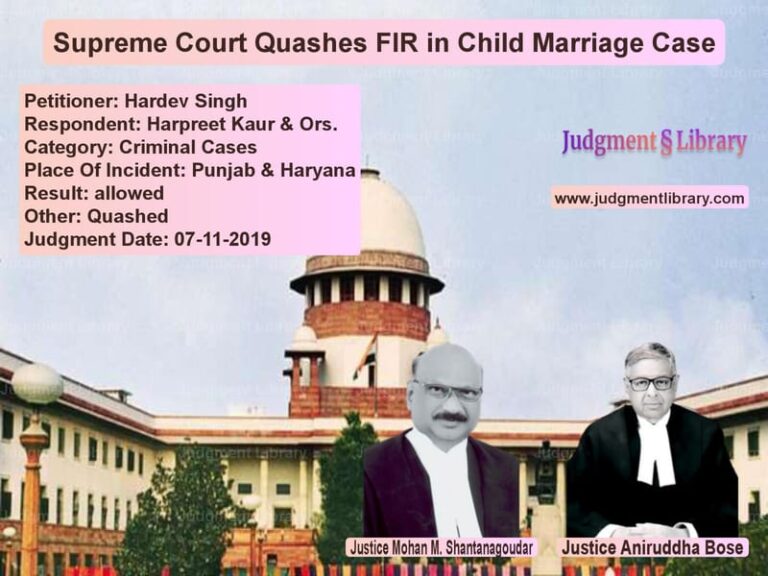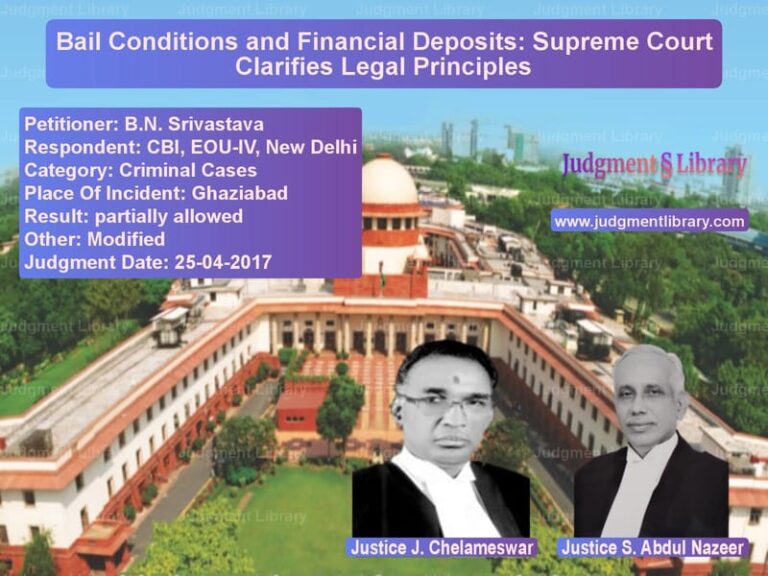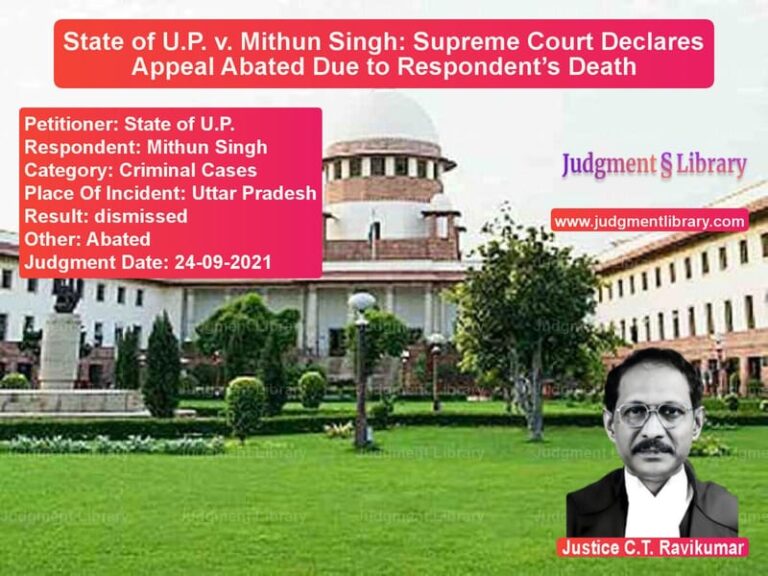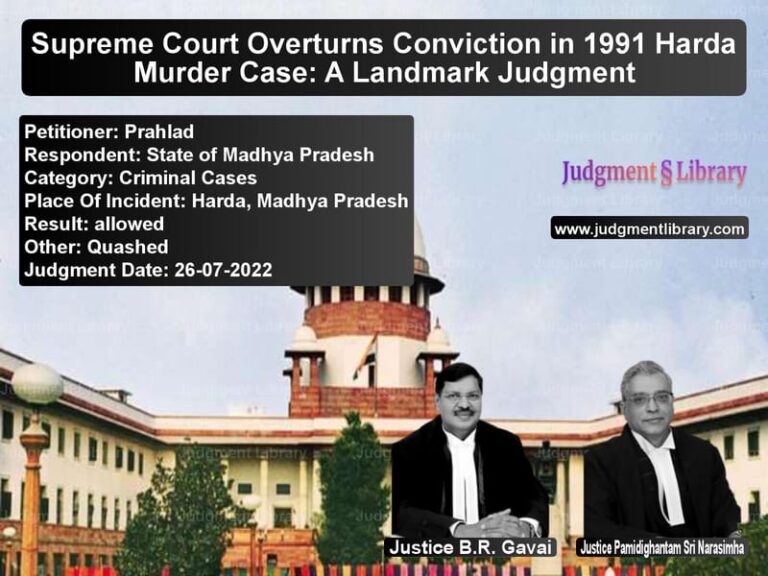Gwalior Development Authority vs. Bhanu Pratap Singh: Supreme Court Sets Aside High Court Order
The case of Gwalior Development Authority vs. Bhanu Pratap Singh revolves around a land lease dispute that was adjudicated by the Supreme Court of India. The dispute concerns the execution of a lease deed for a commercial plot in Gwalior, Madhya Pradesh, which was initially allotted to the respondent, Bhanu Pratap Singh, through a public auction in 1997.
The case highlights the complexities surrounding government land allotments, the obligations of bidders in public auctions, and the extent of judicial intervention in contractual matters.
Background of the Case
In 1997, the Gwalior Development Authority (GDA) invited bids for leasing plots under the Transport City Scheme. Bhanu Pratap Singh was the highest bidder for MC-2 (Market Complex-2) with a total plot area of 27,887.50 sq. meters. His bid of ₹725 per sq. meter was accepted, and an allotment letter was issued.
The conditions required him to deposit the total bid amount of ₹2,06,67,966 in four installments by October 31, 1999. However, the respondent failed to adhere to the payment schedule. Despite the delays, the GDA did not cancel the allotment and eventually executed a lease deed for a reduced area of 18,262.89 sq. meters on March 29, 2006, covering the principal amount paid along with accrued interest.
High Court Ruling
After three and a half years, Bhanu Pratap Singh filed a writ petition in the Madhya Pradesh High Court seeking execution of the lease deed for the remaining 9,625.50 sq. meters. The High Court ruled in his favor and directed the GDA to execute the lease deed for the remaining area without additional consideration, apart from interest for the delay.
Arguments Presented in Supreme Court
Petitioners (Gwalior Development Authority)
The GDA challenged the High Court’s decision, arguing that:
- The respondent failed to meet the payment schedule, and in a normal course, his bid should have been canceled.
- Allowing him to claim the remaining land after such a long delay amounted to an unfair advantage.
- The lease deed for 18,262.89 sq. meters was executed with mutual consent and without any protest.
- The High Court’s decision to direct execution of the lease deed for the remaining land altered a legally binding contract, which was beyond its jurisdiction under Article 226 of the Constitution.
Respondent (Bhanu Pratap Singh)
On the other hand, Bhanu Pratap Singh argued that:
- The tender originally invited bids for the entire 27,887.50 sq. meters, and segregating the land was unjustified.
- His bid was accepted in 1997, and he had already paid the full amount, including interest.
- The GDA acted unfairly by withholding a portion of the land without any clear reason.
- As a government body, the GDA was obligated to act in a fair and transparent manner.
Supreme Court Verdict
The Supreme Court carefully examined the case and ruled in favor of the GDA, setting aside the High Court’s order. The Court made the following observations:
- Delays in Payment: The respondent failed to meet the original payment schedule. The GDA had already extended undue indulgence by allowing delayed payments.
- Finalization of Lease Deed: The lease deed for 18,262.89 sq. meters was executed on March 29, 2006 with mutual consent. Once executed, the transaction was legally concluded.
- Limitations of High Court’s Power: The Supreme Court ruled that the High Court had exceeded its jurisdiction under Article 226 of the Constitution by altering a registered agreement.
- Government’s Right to Commercial Use: The remaining land was part of a government development scheme and could be utilized in accordance with commercial policies.
Key Excerpt from Supreme Court Judgment
“The judgment passed by the High Court in issuing a mandamus to execute the lease deed in favor of the respondent for the remaining area of 9625.50 sq. meters is completely beyond jurisdiction and such directions, in our view, being contrary to law, deserve to be set aside.”
Conclusion
The Supreme Court’s ruling clarifies that courts cannot interfere with finalized commercial agreements unless there is evidence of fraud or procedural irregularities. The decision underscores the importance of adhering to bid conditions and ensuring that government land transactions are conducted transparently and fairly.
For Bhanu Pratap Singh, the Court did allow a potential avenue—he was given the first right to acquire the remaining land at the current circle rate, should he choose to do so. Otherwise, the GDA was free to allocate the land as per its land disposal rules.
Petitioner Name: Gwalior Development Authority and Another.Respondent Name: Bhanu Pratap Singh.Judgment By: Justice Ajay Rastogi, Justice Bela M. Trivedi.Place Of Incident: Gwalior, Madhya Pradesh.Judgment Date: 19-04-2023.
Don’t miss out on the full details! Download the complete judgment in PDF format below and gain valuable insights instantly!
Download Judgment: gwalior-development-vs-bhanu-pratap-singh-supreme-court-of-india-judgment-dated-19-04-2023.pdf
Directly Download Judgment: Directly download this Judgment
See all petitions in Contract Disputes
See all petitions in Property Disputes
See all petitions in Landlord-Tenant Disputes
See all petitions in Judgment by Ajay Rastogi
See all petitions in Judgment by Bela M. Trivedi
See all petitions in allowed
See all petitions in Quashed
See all petitions in supreme court of India judgments April 2023
See all petitions in 2023 judgments
See all posts in Civil Cases Category
See all allowed petitions in Civil Cases Category
See all Dismissed petitions in Civil Cases Category
See all partially allowed petitions in Civil Cases Category







